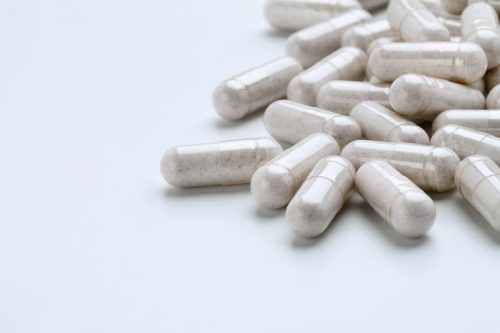3 Probiotics That Trigger an Ozempic-Like Weight Loss Effect, Doctors Say
They can boost GLP-1 levels and improve your gut health.
Gut health may be having its moment in the spotlight, but many experts say it's more than just a passing fad. According to the American Medical Association (AMA), a healthy gut is of crucial importance to digestion, metabolism, immunity, and overall well-being. In addition, a better understanding of our gut microbiota is also opening doors to surprising new frontiers in health—including taking probiotics for weight loss.
In fact, a 2021 study published in the journal Nutrients explains that obesity and obesity-related diseases "are not only the result of genetic factors, eating habits or lack of physical activity. It also been proven that the Intestinal Microbiota (IM) is an environmental factor in its development."
That's why probiotics may be a helpful tool in your weight loss journey—and a safer alternative to weight loss medications like Ozempic. According to doctors, these are the three most effective probiotics for tipping the scales in your favor.
RELATED: Certain Foods Trigger Natural Ozempic-Like Weight Loss Effect, Doctor Says.
4 Best Probiotics for Weight Loss
1. Akkermansia

It's no secret that Ozempic comes with a wide range of potentially serious side effects—a fact that's pushing many patients to seek alternative routes to weight loss.
"I've had some patients ask me how they can get the effects of Ozempic without having to take it," Lauren DeDecker, MD, an internal medicine physician, nutritionist, and personal trainer, shared in a recent TikTok clip.
One way, she says, is through the gut microbiome: "Ozempic works by increasing GLP-1, which in turn flows the movement of food from your stomach through your intestines. There's a certain bacteria called Akkermansia that's been shown to naturally increase GLP-1 levels."
A 2020 article published in the journal Fronteirs corroborates that A. muciniphila, a strain of Akkermansia, can aid in weight loss.
"The causal beneficial impact of A. muciniphila treatment on obesity is coming to light, having been proved by a variety of animal models and human studies," the study authors write. "A. muciniphila has been characterized as a beneficial player in body metabolism and has great prospects for treatments of the metabolic disorders associated with obesity, as well as being considered for next-generation therapeutic agents."
RELATED: 5 Best Anti-Aging Supplements, According to a Doctor.
2. Lactobacillus

A 2013 study in the Journal of Functional Foods found that Lactobacillus, a probiotic bacteria that produces lactic acid in the gut, could help significantly lower one's body weight. Two types in particular—Lactobacillus fermentum (LF) and Lactobacillus amylovorus (LA)—were especially effective at lowering body fat and altering gut microflora in healthy but overweight individuals.
The placebo-controlled, double-blind study consisted of three 43-day phases, with a six-week reset period between each one. Participants were randomized into three groups: one that consumed a "control" yogurt containing no probiotics; one that consumed yogurt containing BSH-active LA bacteria; and one that consumed yogurt containing FAE-active LF bacteria.
They ultimately found that those in the control group lost one percent of their body mass over the course of the study period, while those who consumed LF probiotic yogurt saw a three percent decrease. Those who consumed LA probiotic yogurt saw the greatest weight loss. They reduced their total fat mass by four percent over the study period.
RELATED: What Really Happens If You Stop Taking Ozempic, Doctors Say.
3. Bifidobacterium

According to the 2020 Nutrients study, Bifidobacterium bifidum (B. bifidum) is another probiotic that can, like Lactobacillus, help you achieve weight loss within 12 weeks.
"Specific strains belonging to the genus Lactobacillus and Bifidobacterium were the most used and those that showed the best results in reducing body weight," they note. "It should be noted that a reduction [equal to or greater than] five percent in initial body weight in a period of six months is clinically relevant and this would be associated with a significant reduction in some cardiovascular risk factors such as a reduction in blood pressure, lipids and blood glucose."
In one trial reviewed in the meta-analysis, 40 percent of the participants in the probiotic group lost this much body weight after nine months of supplementation, without restricting their diets.
For more wellness advice sent directly to your inbox, sign up for our daily newsletter.
Best Life offers the most up-to-date information from top experts, new research, and health agencies, but our content is not meant to be a substitute for professional guidance. When it comes to the medication you're taking or any other health questions you have, always consult your healthcare provider directly.
- Source: Nutrients
- Source: Frontiers
- Source: Journal of Functional Foods
- Source: Scientific Reports






















